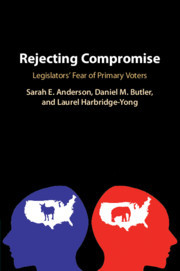Rejecting Compromise Legislators' Fear of Primary Voters
Langue : Anglais
Auteurs : Anderson Sarah E., Butler Daniel M., Harbridge-Yong Laurel

This analysis of legislative behavior shows how primary voters can obstruct political compromise and outlines potential reforms to remedy gridlock.
Legislative solutions to pressing problems like balancing the budget, climate change, and poverty usually require compromise. Yet national, state, and local legislators often reject compromise proposals that would move policy in their preferred direction. Why do legislators reject such agreements? This engaging and relevant investigation into how politicians think reveals that legislators refuse compromise - and exacerbate gridlock - because they fear punishment from voters in primary elections. Prioritizing these electoral interests can lead lawmakers to act in ways that hurt their policy interests and also overlook the broader electorate's preferences by representing only a subset of voters with rigid positions. With their solution-oriented approach, Anderson, Butler, and Harbridge-Yong demonstrate that improving the likelihood of legislative compromise may require moving negotiations outside of the public spotlight. Highlighting key electoral motives underlying polarization, this book is an excellent resource for scholars and students studying Congress, American politics, public policy, and political behavior.
1. Rejecting compromise, getting gridlock; 2. Legislators reject half-loaf compromises; 3. Legislators reject half-loaf compromises because they fear voter retribution; 4. Primary voters as the source of punishment; 5. Voter punishment is rare but real; 6. Structuring negotiations in the shadow of primary voter punishment; 7. Compromise, voter punishment in primaries, and legislative gridlock; References.
Sarah E. Anderson is an Associate Professor of environmental politics at the University of California, Santa Barbara. Her research examines how legislature and bureaucracy shape policy. She has previously worked as a legislative assistant for a member of Congress.
Dan Butler is a Full Professor of political science at the University of California, San Diego. His research uses experiments to understand representation. He is the author of Representing the Advantaged (Cambridge, 2014).
Laurel Harbridge-Yong is an Associate Professor of Political Science and a Faculty Fellow at the Institute for Policy Research at Northwestern University. Her work focuses on partisan conflict and party influences. She is the author of Is Bipartisanship Dead? (Cambridge, 2015).
Dan Butler is a Full Professor of political science at the University of California, San Diego. His research uses experiments to understand representation. He is the author of Representing the Advantaged (Cambridge, 2014).
Laurel Harbridge-Yong is an Associate Professor of Political Science and a Faculty Fellow at the Institute for Policy Research at Northwestern University. Her work focuses on partisan conflict and party influences. She is the author of Is Bipartisanship Dead? (Cambridge, 2015).
Date de parution : 02-2021
Ouvrage de 182 p.
15.2x22.9 cm
Date de parution : 02-2020
Ouvrage de 182 p.
15.8x23.5 cm
Disponible chez l'éditeur (délai d'approvisionnement : 14 jours).
Prix indicatif 107,81 €
Ajouter au panierThème de Rejecting Compromise :
© 2024 LAVOISIER S.A.S.



